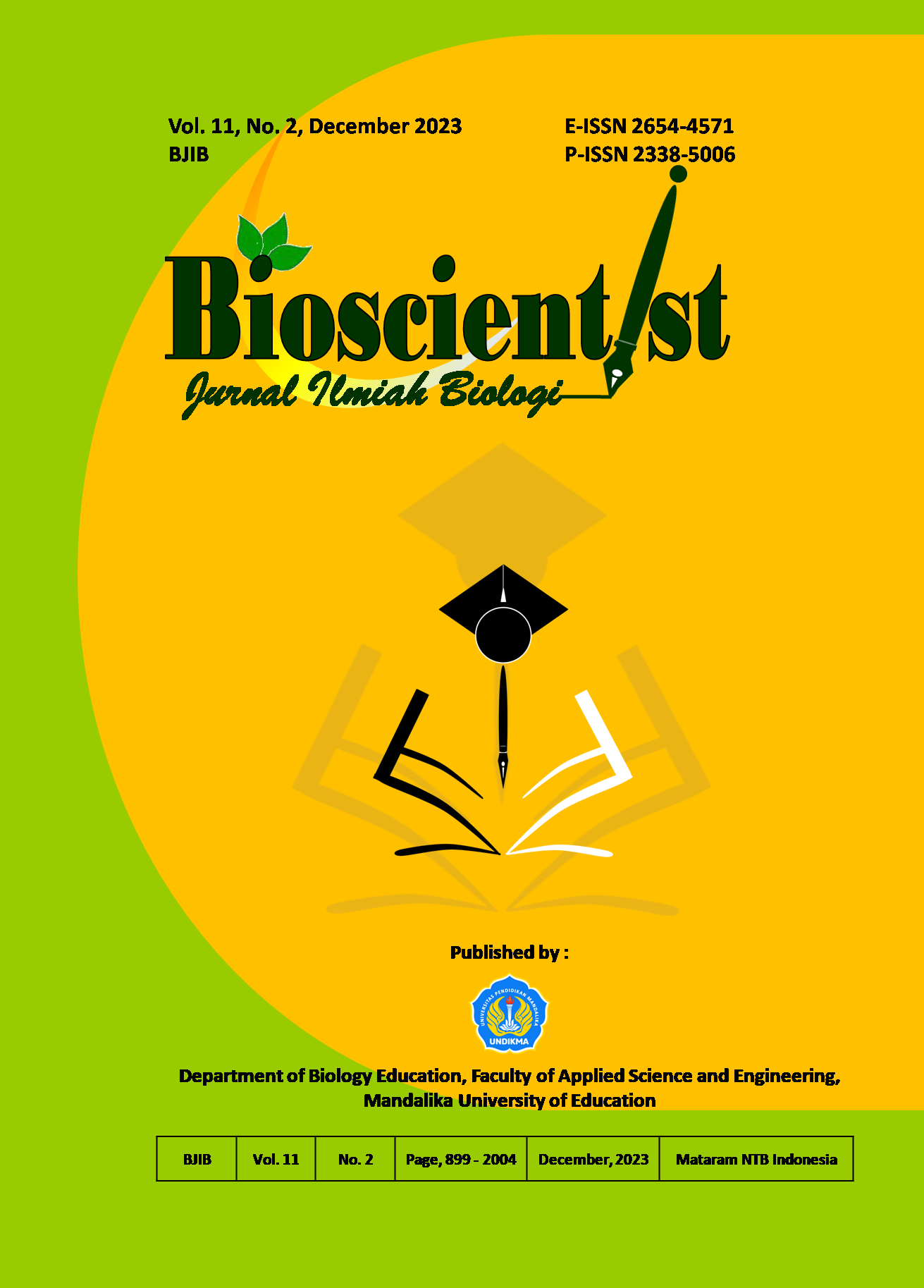Mangrove Ecotourism as an Education and Learning Facility
DOI:
https://doi.org/10.33394/bioscientist.v11i2.10028Keywords:
Mangrove Ecotourism, Gili Sulat, Education and Learning, Biodiversity Conservation, Experiential Learning.Abstract
This study investigates the educational benefits of mangrove tourism on Gili Sulat, an uninhabited island designated as an Aquatic Tourism Park in Lombok, Indonesia. The study is exploratory research. The research sample was determined purposively, they were 10 fifth-semester Biology Education students engaged in practicums on Gili Sulat. Through a questionnaire and interview sessions, the study explores the students' perceptions and experiences regarding the educational aspects of mangrove ecotourism. Perception data was analyzed qualitatively. The findings reveal that the primary motivation for the students' visit was education and learning, emphasizing the unique ecosystem's allure. The students demonstrated a nuanced understanding of the mangrove ecosystem's role in protecting coastal environments and expressed heightened inspiration for environmental protection. Their suggestions for improvement, such as species name boards, and the willingness to revisit Gili Sulat for educational activities underscore the enduring impact of mangrove ecotourism on fostering environmental awareness and responsibility. The study contributes to the discourse on the educational potential of ecotourism, particularly in the context of mangrove ecosystems, advocating for the continued promotion and preservation of such destinations as invaluable educational resources.References
Angela, V. F. (2023). Strategi Pengembangan Ekowisata dalam Mendukung Konservasi Alam Danau Tahai. JIM: Jurnal Ilmiah Mahasiswa Pendidikan Sejarah, 8(3), Article 3. https://doi.org/10.24815/jimps.v8i3.24980
Arrobas, F., Ferreira, J., Brito-Henriques, E., & Fernandes, A. (2020). Measuring Tourism and Environmental Sciences Students’ Attitudes Towards Sustainable Tourism. Journal of Hospitality, Leisure, Sport & Tourism Education, 27, 100273. https://doi.org/10.1016/j.jhlste.2020.100273
Bandh, S. A., Malla, F. A., Qayoom, I., Mohi-Ud-Din, H., Butt, A. K., Altaf, A., Wani, S. A., Betts, R., Truong, T. H., Pham, N. D. K., Cao, D. N., & Ahmed, S. F. (2023). Importance of Blue Carbon in Mitigating Climate Change and Plastic/Microplastic Pollution and Promoting Circular Economy. Sustainability, 15(3), 2682. https://doi.org/10.3390/su15032682
Butarbutar, R. R., & Pollo, H. N. (2020). PKM SD Inpres 2 Pakuweru Kecamatan Tenga Kabupaten Minahasa Selatan: Ekowisata Berbasis Keanekaragaman Hayati dan Konservasi. Techno Science Journal, 2(2), Article 2. https://doi.org/10.35799/tsj.v2i2.34124
Creswell, J. W., & Creswell, J. D. (2018). Research Design: Qualitative, Quantitative, and Mixed Methods Approaches (5th edition). California: SAGE Publications, Inc.
De Dominicis, M., Wolf, J., van Hespen, R., Zheng, P., & Hu, Z. (2023). Mangrove Forests Can be an Effective Coastal Defence in the Pearl River Delta, China. Communications Earth & Environment, 4(1), Article 1. https://doi.org/10.1038/s43247-022-00672-7
Donohoe, H. M. (2011). Defining Culturally Sensitive Ecotourism: A Delphi Consensus. Current Issues in Tourism, 14(1), 27–45. https://doi.org/10.1080/13683500903440689
Felzmann, H. (2009). Ethical Issues in School-Based Research. Research Ethics, 5(3), 104–109. https://doi.org/10.1177/174701610900500304
Hadiprayitno, G., Ilhamdi, M.L., &. Mertha, G. (2014). Kekhasan Morfologi Spesies Mangrove di Gili Sulat. Jurnal Biologi Tropis, 14(2), 120-128. https://doi.org/10.29303/jbt.v14i2.139
Hilyana, S., Amir, S., & Waspodo, S. (2020). Kesesuaian Zonasi Pulau-pulau Kecil: Studi Kasus Kawasan Konservasi Gili Sulat Gili Lawang Lombok Indonesia. Jurnal Sains Teknologi & Lingkungan, 6(2), 202–215. https://doi.org/10.29303/jstl.v6i2.183
Kiper, T. (2013). Role of Ecotourism in Sustainable Development. In M. Ozyavuz (Ed.), Advances in Landscape Architecture. InTech. https://doi.org/10.5772/55749
Kunjuraman, V., Hussin, R., & Aziz, R. C. (2022). Community-Based Ecotourism as a Social Transformation Tool for Rural Community: A Victory or a Quagmire? Journal of Outdoor Recreation and Tourism, 39, 100524. https://doi.org/10.1016/j.jort.2022.100524
Nesha Dushani, S., Aanesen, M., & Armstrong, C. W. (2023). Willingness to Pay for Mangrove Restoration to Reduce the Climate Change Impacts on Ecotourism in Rekawa Coastal Wetland, Sri Lanka. Journal of Environmental Economics and Policy, 12(1), 19–32. https://doi.org/10.1080/21606544.2022.2065364
Sam, K., Zabbey, N., Gbaa, N. D., Ezurike, J. C., & Okoro, C. M. (2023). Towards a Framework for Mangrove Restoration and Conservation in Nigeria. Regional Studies in Marine Science, 66, 103154. https://doi.org/10.1016/j.rsma.2023.103154
Samal, R., & Dash, M. (2023). Ecotourism, Biodiversity Conservation and Livelihoods: Understanding the Convergence and Divergence. International Journal of Geoheritage and Parks, 11(1), 1–20. https://doi.org/10.1016/j.ijgeop.2022.11.001
Satrya, I. D. G., Kaihatu, T. S., & Pranata, L. (2019). Ecotourism as a Soft Skill Practice for Millenials. Jurnal Entrepreneur dan Entrepreneurship, 8(2), 22–29. https://doi.org/10.37715/jee.v8i2.1121
Yip, C., Han, N.-L., & Sng, B. (2016). Legal and Ethical Issues in Research. Indian Journal of Anaesthesia, 60(9), 684. https://doi.org/10.4103/0019-5049.190627













